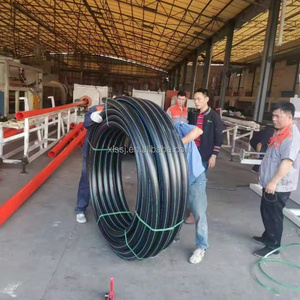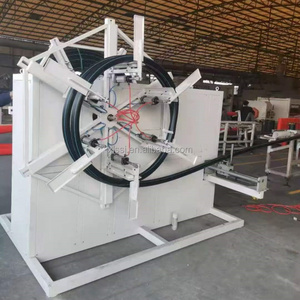(4953 products available)








































































































































































































































A PE roll pipe irrigation is a polyethylene plastic tube used for irrigation. It is lightweight, flexible, and durable, making it suitable for different kinds of irrigation systems. The different types of irrigation systems that use PE roll pipes include:
Drip irrigation
Also known as trickle irrigation, it is a system that delivers water directly to the plants' roots through a network of tubes. A roll pipe is an integral part of this irrigation system because it transports water to drip emitters. The emitters release water slowly and steadily, ensuring that plants receive the right amount of water. This irrigation system conserves water and is ideal for arid regions and water-sensitive plants.
Sprinkler irrigation
This irrigation system simulates natural rainfall by spraying water into the air using pipes, pumps, and sprinkler heads. The PE roll pipes transport water from the source to the sprinkler head. The system is suitable for irrigating large fields and areas with varying topographies.
Subsurface irrigation
In this irrigation method, water is delivered to plants through pipes buried underground near the root zone. Polyethylene pipes are durable and resistant to chemicals, making them ideal for this irrigation method. They are also lightweight and flexible, which makes installation easy.
Surface irrigation
Water from a source is directed to flow over the soil surface and into the root zone in this method. It includes furrow, flood, basin, border, and surge irrigation. The irrigation system needs a water source and a way to control its flow and direction. PE pipes are used to transport water to the fields, where it is distributed using gravity.
Center pivot irrigation
This is a type of sprinkler irrigation system that uses a rotating, overhead structure mounted on wheeled frames. The structure moves in a circular pattern around a fixed point, covering large areas of land. The system uses PE roll pipes because they are lightweight and flexible. Also, the pipes can withstand different pressures and are resistant to UV radiation and chemicals.
Durability
Roll pipes are used for irrigation because they are resistant to wear and tear from environmental factors. They can withstand exposure to the sun without becoming brittle or cracking. They can also resist impact and are less likely to get damaged when they hit hard objects or during installation.
Corrosion resistance
These irrigation pipes have the ability to resist corrosion from chemicals, fertilizers, and moisture. This ensures that the pipes have a long lifespan and are not affected by the acidic soils found in farms. Unlike metallic pipes, PE pipes are not affected by corrosive elements, ensuring they are strong and stable.
Flexibility
PE irrigation pipes are flexible and can be curved and bent when installing on uneven terrains and landscapes. This flexibility allows the pipes to be installed on hilly or mountainous areas without breaking or causing irrigation problems. The flexibility also makes it easier to create bends and corners in irrigation setups.
Lightweight
PE irrigation pipes are lightweight, making them easy to transport and install. This reduces the labor costs of installing the pipes since fewer people are needed to install them. It also makes the pipes more economical as they use fewer resources to transport them to different locations.
Joint integrity
PE irrigation pipes are welded at joints to create a strong bond that is resistant to leaks and tears. The joint integrity ensures that water is transported efficiently without any losses. It also prevents tears in the pipes, which can cause a collapse or breakage.
Hydraulic efficiency
The smooth interior walls of these irrigation pipes ensure that water flows freely without any obstruction. This reduces the amount of energy needed to pump water through the pipes. The hydraulic efficiency also ensures water is delivered to farms at a consistent rate, benefiting irrigation practices.
Resistance to biofilm formation
PE irrigation pipes have smooth interiors that prevent the formation of biofilms. This ensures the water transported is clean and safe for consumption. The resistance to biofilm formation also reduces the need for chemical cleaning, which can contaminate the water.
There are different application scenarios of pe roll pipe irrigation, including:
Agricultural Irrigation
PE roll pipes are widely used in farmland irrigation systems. They distribute water efficiently to crops, ensuring consistent and targeted irrigation. This is particularly beneficial in reducing water wastage by directing water to the root zones of plants. The pipes are also ideal for different irrigation methods, such as drip and sprinkler systems. They facilitate the delivery of water in agricultural settings, enhancing crop yields and overall productivity.
Landscape Irrigation
These pipes are used in residential and commercial landscape irrigation systems. They ensure the efficient distribution of water to gardens, lawns, and ornamental plants. This enhances water conservation through targeted irrigation practices like drip irrigation. Besides, PE roll pipes are durable and can be buried underground, offering a seamless and aesthetic irrigation solution.
Golf Courses and Sports Fields
PE irrigation pipes are used in the irrigation systems of golf courses and sports fields. They ensure the consistent and uniform distribution of water to maintain healthy grass. Moreover, the pipes help reduce water runoff and ensure water is directed to the desired areas, which is vital in water management in large turf areas like golf courses and stadiums. This ensures the longevity and health of the turf.
Orchards and Vineyards
The irrigation pipes are critical in managing water supply in orchards and vineyards. They enable regulated water delivery, which is essential for fruit and wine production. Additionally, the pipes support drip irrigation systems that provide water directly to the root zones of trees and vines, enhancing water efficiency and improving crop quality.
Greenhouses
PE irrigation pipes are used to deliver water efficiently in controlled environments like greenhouses. This ensures a consistent water supply for various crops. Additionally, these pipes support drip irrigation systems that minimize water loss through evaporation or runoff. This is crucial in maintaining optimal moisture levels in greenhouse settings.
When purchasing a PE irrigation pipe for resale, it is important to choose a product that is popular among farmers and other end buyers. The following are some factors that farmers consider when purchasing these pipes.
Farmers will first look at the durability of the pipes. They will choose irrigation systems that are more durable and have a longer lifespan. Therefore, irrigation suppliers should stock PE irrigation pipes that are durable and have a lifespan of up to 50 years.
Another factor farmers consider is the cost of the pipes and fittings. Businesses should look for vendors offering competitive prices for the pipes and fittings.
Farmers also look at the installation process. They will choose pipes that are easily connected and require minimal fittings. These make the whole irrigation system more cost-effective.
Another factor to consider when choosing the right product to buy is the size and capacity of the pipe. Different farms have different sizes and capacities. It is important to get a pipe that is compatible with the irrigation system in place.
Business owners can get vendors offering PE irrigation pipes and fittings by searching the internet. They can also go to local trade shows and exhibitions to get contacts of vendors with good reviews. The reviews will also help to choose a vendor with good quality products.
It is also possible to get a vendor by getting a referral from another business owner. The referral will direct the business owner to a vendor they know is trustworthy and has good quality products.
Once business owners get a list of vendors they can contact, they should contact them and ask questions to determine the one who will meet their needs. It is important to get the vendor's customer care services and how they handle complaints. Choose a vendor who has a good customer care service who will be there to answer any questions and give feedback.
After all the considerations, business owners should visit the vendor's site and look at the manufacturing process. This will help to determine the quality of the pipes and fittings.
Q1. What does PE stand for in irrigation?
A1. Polyethylene. It is a plastic material used to make pipes for irrigation systems.
Q2. What size pipe is best for drip irrigation?
A2. 1/2-inch PVC or polyethylene (PE) pipe. This size is large enough to cover a big area and small enough to follow the layout of the garden.
Q3. How long will irrigation pipes last?
A3. Irrigation pipes can last 30 years or more, depending on the material used. PVC and polyethylene (PE) pipes have a long lifespan.
Q4. What are the disadvantages of drip irrigation?
A4. The main disadvantage is that it is expensive to install and maintain. It also requires a clean water supply since the pipes can get clogged easily.
Q5. What type of pipe is used for irrigation?
A5. PVC, polyethylene (PE), or HDPE pipes. These materials are durable, flexible, and resistant to weather conditions.